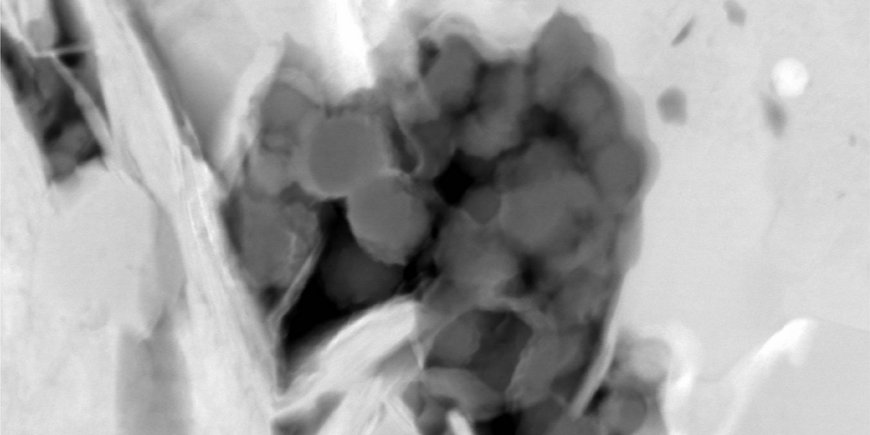A re-evaluation of unconventional natural gas in the Karoo Basin in South Africa The Karoo Basin (South Africa) is known to contain unconventional natural gas deposits. As this is enclosed in dense slate rock, it is also known as shale gas. In the light of the recent interest in unconventional shale gas potential of the Karoo Basin, Naledi Chere from the Nelson Mandela University in South Africa together with her colleagues and Hans- Martin Schulz from the GFZ-Section Organic Geochemistry present two possible shale gas reservoirs with substantially higher resource estimates than analyzed before.
The natural gas resources in the Karoo Basin, which covers an area of 620 000 km2, are considered "unconventional". The gas is enclosed in slate formations with low permeability and can only be released by the process of hydraulic stimulation, also known as "hydraulic fracturing" or "fracking". In contrast, conventional reservoirs contain pores from which the gas could escape without stimulation when tapped with a borehole.
The Karoo Basin of South Africa was explored for energy resources since the 1960s. Schulz and colleagues re-examined a wide range of existing drill holes and detected significant proportions of drilling fluids that may have affected earlier oil or gas calculations. “Thus, previous results may not be entirely reliable”, says Schulz. However, the resource evaluation was extended to shallower horizons, and broadens the spectrum of possible new exploration targets.
Involving the population at an early stage
Today, the South African energy system is currently based mainly on coal, oil and petroleum fuels, with a smaller contribution from nuclear, wind, solar. Natural gas is used only in small quantities. The potential economic and energy security benefits of a shale gas resource in the Karoo Basin could be substantial, as are both the positive and negative social and environmental issues associated with a domestic shale gas industry. For example, the energy production by shale gas could improve the CO2 footprint.
However, the large water volumes needed for hydraulic fracturing are currently under the critical eye of public opinion with respect to the recent water deficit in South Africa. “Therefore it is important to undertake detailed analytical work on possible unconventional shale gas reservoirs with improved water resource monitoring and to inform and involve the South African public and decision-makers at an early stage”, stresses Schulz. (ks)
Original study: Chere, N., Linol, B., Schulz, H., de Wit, M., 2018. Lateral and temporal variations of black shales across the southern Karoo Basin- Implications for shale gas exploration. South African Journal of Geology, 120 (4), pp. 543-566. DOI: https://doi.org/10.25131/gssajg.120.4.541








![[Translate to English:] Torsten Sachs in front of a climate station on a field](/fileadmin/_processed_/3/9/csm__TorstenSachs_bearbeitet_GS_4a1365ef84.jpeg)

![[Translate to English:] left image flood at the Ahrtal: image from above, several houses are flooded; left image:: Heidi Kreibich;](/fileadmin/_processed_/4/4/csm_Bild2_9af0130e9f.png)



![[Translate to English:] Start der Vega Rakete](/fileadmin/_processed_/6/4/csm_20231201-kachel_Vega-VV23-launch_ESA-CNES-Arianespace_706716b68c.jpeg)









![[Translate to English:] Poster exhibition at the Brandenburg Hydrogen Day at the GFZ, some participants in the foreground](/fileadmin/_processed_/6/5/csm_Erster_Brandenburgischer_Wasserstofftag_GFZ_402fcec95e.jpeg)
![[Translate to English:] Group picture of the participants](/fileadmin/_processed_/9/4/csm_20231108_CAWa-Workshop-Tashkent_Gruppenbild_99ea779d8a.jpeg)

![[Translate to English:] [Translate to English:] Hörsaal](/fileadmin/_processed_/e/6/csm_H%C3%B6rsal_e21ac645fb.jpeg)


![[Translate to English:] The Delegations in the Historic Library on the Telegrafenberg. In the back there are from left to right, the Dutch Ambassador for Germany, Ronald van Roeden, the Dutch Minister for Education, Culture and Science, Robbert Dijkgraaf and the scientific director of the GFZ, Susanne Buiter.](/fileadmin/_processed_/d/b/csm_Kachel-2_9eba4b4212.jpeg)

